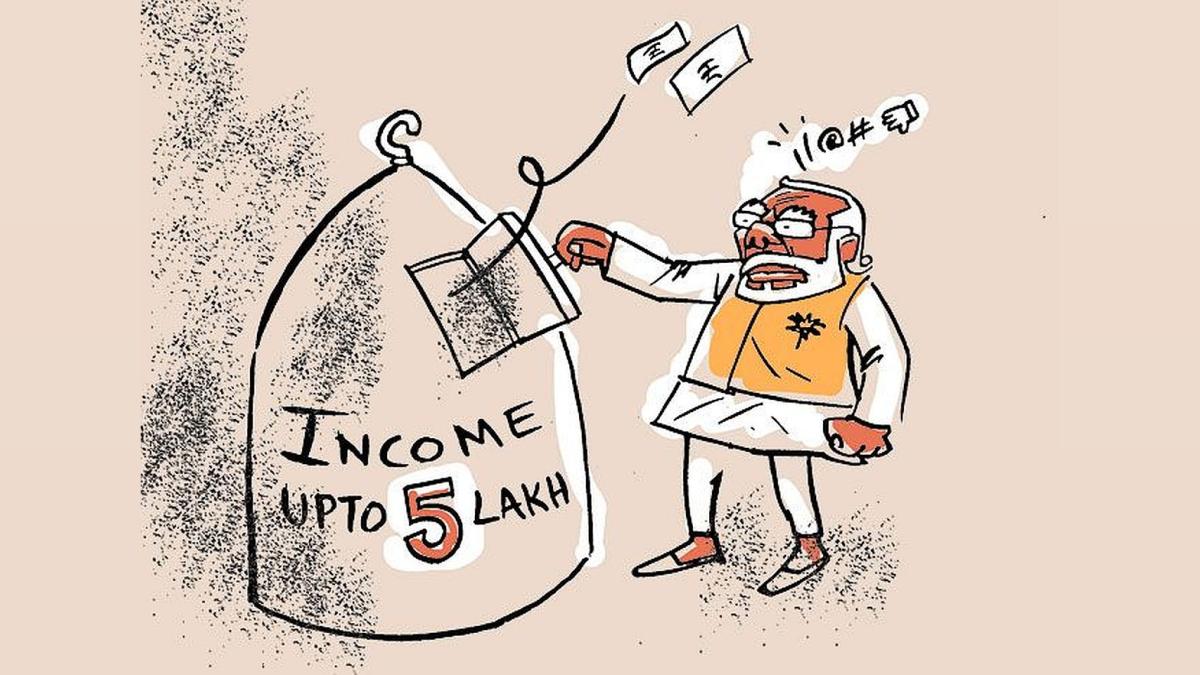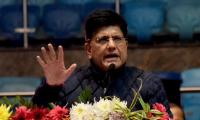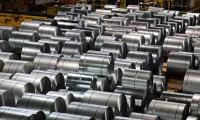EU Deforestation Rules, Carbon Tax Unfair: Goyal
India's Commerce Minister Piyush Goyal criticizes EU's deforestation regulation and carbon tax, saying they are unfair and will impact Indian industries. He also raises concerns about EU's safeguard measures on steel products.

Illustration: Dominic Xavier/Rediff.com
New Delhi, Oct 11 (PTI) The European Union's (EU) deforestation regulation and carbon tax are unfair and would impact Indian industries, Commerce and Industry Minister Piyush Goyal said on Friday.
He also said the EU's safeguard measures on some steel products are irrational too.
Addressing industry and representatives of EU here on the launch of Federation of European Business in India (FEBI), he said Indian industries are "confronted with unfair rules of deforestation, rules around CBAM (Carbon Border Adjustment Mechanism) and various other measures".
Major agriculture-exporting countries, including Brazil, India, Indonesia and the US, have raised objections to the EU Deforestation Regulation (EUDR).
The EUDR was adopted on May 16, 2023, and seeks to prevent the import of specified goods contributing to deforestation and forest degradation in the EU market.
The covered products include coffee, leather, oil cake, wood furniture, paper, and paperboard, with plans to expand the product list further.
However, the regulation has faced significant backlash from several major trading partners.
The Global Trade Research Initiative (GTRI) said India's exports of products like coffee, leather hides, and paperboard worth USD 1.3 billion annually to the European Union could be impacted due to the regulation.
Similarly, India has raised strong objections against the CBAM, under which EU has proposed to impose additional duty on seven carbon-intensive sectors, including steel, cement, fertiliser, aluminium and hydrocarbon products.
The CBAM or carbon tax (a kind of import duty) will come into effect from January 1, 2026.
Finance Minister Nirmala Sitharaman too has recently said the CBAM is unilateral and arbitrary and will hurt India's exports after its implementation by EU.
Last month, India proposed the imposition of retaliatory customs duties, under WTO norms, on certain value of goods imported from EU, as the two sides have failed to reach a consensus on the EU's safeguard measures on some steel products.
Goyal said the developed world is taking such measures by "disrespecting" the multilateral agreements on climate change.
He said that in the Paris Agreement it was decided that the developed world -- which in the first place is responsible for the environmental problems of the world -- will contribute to the low-cost, long-term financing and will also provide grants and technology.
But, COP 21 (Paris Climate Conference) premise is sought to be demolished by the EU, he said.
He added that on the issue of imposing safeguard duty measures, which are "irrational duties and totally against the MFN (most favoured nation) laws of WTO (World Trade Organization) on certain steel products", India is discussing the matter for the last 5-6 years now.
"I have been holding back, I have been negotiating and requesting ...India does not have unfair trade practices, now should we be subject to that additional duty? Now after six years, we have to take other measures," Goyal said.
He added that those measures are "not going to be conducive for the kind of good relations that we believe Europe and India share and should continue to share at the business level".
Such issues and others like labour matters can best be addressed through bilateral discussions, the minister said.
In India, no company has faced labour problems in a long time and "the last labour problem, I recollect was in Maruti, 10 years ago...One issue in 10 years. Our companies working in many European companies are also confronted with significant labour issues," he said.
"It will be a good idea that we take up all these issues bilaterally, so that there can be ease of doing business on both sides and so that we can support each other in expanding trade."
On the issue raised by the EU side on the bilateral investment treaty, he said that India has a Swedish company which has been working here for the last 120 years.
"India is a vibrant democracy with a rule of law. It protects investments. We had only one mishap - the Vodafone retrospective taxation...our (BJP) party has publicly denounced that..We have withdrawn also and we have assured the world that we will not have retrospective taxes or policy decisions," Goyal said adding "But I can list out a number of such similar actions which call for distress to Indian industry (in EU)".
He also said the EU's safeguard measures on some steel products are irrational too.
Addressing industry and representatives of EU here on the launch of Federation of European Business in India (FEBI), he said Indian industries are "confronted with unfair rules of deforestation, rules around CBAM (Carbon Border Adjustment Mechanism) and various other measures".
Major agriculture-exporting countries, including Brazil, India, Indonesia and the US, have raised objections to the EU Deforestation Regulation (EUDR).
The EUDR was adopted on May 16, 2023, and seeks to prevent the import of specified goods contributing to deforestation and forest degradation in the EU market.
The covered products include coffee, leather, oil cake, wood furniture, paper, and paperboard, with plans to expand the product list further.
However, the regulation has faced significant backlash from several major trading partners.
The Global Trade Research Initiative (GTRI) said India's exports of products like coffee, leather hides, and paperboard worth USD 1.3 billion annually to the European Union could be impacted due to the regulation.
Similarly, India has raised strong objections against the CBAM, under which EU has proposed to impose additional duty on seven carbon-intensive sectors, including steel, cement, fertiliser, aluminium and hydrocarbon products.
The CBAM or carbon tax (a kind of import duty) will come into effect from January 1, 2026.
Finance Minister Nirmala Sitharaman too has recently said the CBAM is unilateral and arbitrary and will hurt India's exports after its implementation by EU.
Last month, India proposed the imposition of retaliatory customs duties, under WTO norms, on certain value of goods imported from EU, as the two sides have failed to reach a consensus on the EU's safeguard measures on some steel products.
Goyal said the developed world is taking such measures by "disrespecting" the multilateral agreements on climate change.
He said that in the Paris Agreement it was decided that the developed world -- which in the first place is responsible for the environmental problems of the world -- will contribute to the low-cost, long-term financing and will also provide grants and technology.
But, COP 21 (Paris Climate Conference) premise is sought to be demolished by the EU, he said.
He added that on the issue of imposing safeguard duty measures, which are "irrational duties and totally against the MFN (most favoured nation) laws of WTO (World Trade Organization) on certain steel products", India is discussing the matter for the last 5-6 years now.
"I have been holding back, I have been negotiating and requesting ...India does not have unfair trade practices, now should we be subject to that additional duty? Now after six years, we have to take other measures," Goyal said.
He added that those measures are "not going to be conducive for the kind of good relations that we believe Europe and India share and should continue to share at the business level".
Such issues and others like labour matters can best be addressed through bilateral discussions, the minister said.
In India, no company has faced labour problems in a long time and "the last labour problem, I recollect was in Maruti, 10 years ago...One issue in 10 years. Our companies working in many European companies are also confronted with significant labour issues," he said.
"It will be a good idea that we take up all these issues bilaterally, so that there can be ease of doing business on both sides and so that we can support each other in expanding trade."
On the issue raised by the EU side on the bilateral investment treaty, he said that India has a Swedish company which has been working here for the last 120 years.
"India is a vibrant democracy with a rule of law. It protects investments. We had only one mishap - the Vodafone retrospective taxation...our (BJP) party has publicly denounced that..We have withdrawn also and we have assured the world that we will not have retrospective taxes or policy decisions," Goyal said adding "But I can list out a number of such similar actions which call for distress to Indian industry (in EU)".
You May Like To Read
TODAY'S MOST TRADED COMPANIES
- Company Name
- Price
- Volume
- Vodafone-Idea-L
- 11.65 (+ 3.56)
- 106772451
- Alstone-Textiles
- 0.28 ( -3.45)
- 44187760
- Mangalam-Industrial
- 0.88 ( -2.22)
- 39177573
- Sunshine-Capital
- 0.27 (+ 3.85)
- 35956340
- GMR-Airports
- 104.40 (+ 6.37)
- 30453005




